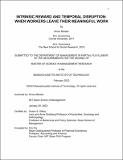| dc.contributor.advisor | Silbey, Susan S. | |
| dc.contributor.author | Minster, Arrow | |
| dc.date.accessioned | 2023-03-31T14:44:36Z | |
| dc.date.available | 2023-03-31T14:44:36Z | |
| dc.date.issued | 2023-02 | |
| dc.date.submitted | 2023-02-07T19:52:24.551Z | |
| dc.identifier.uri | https://hdl.handle.net/1721.1/150277 | |
| dc.description.abstract | Many workers pursue opportunities for their intrinsic rewards as well as their extrinsic rewards. Intrinsic rewards like meaningfulness – having a positive impact on others – is also a strong commitment device. Even in the face of low pay or unsafe working conditions, workers can justify staying with meaningful work. Workers can justify leaving their meaningful work when factors external to their job, like family commitments, require their time and attention; without such external factors, workers are likely to stay in seemingly meaningful jobs even in the absence of extrinsic rewards. Based on interviews with nightlife entertainers during the pandemic in 2020, this paper identifies a case of workers leaving an intrinsically rewarding job. Specifically, workers’ embodied experience of meaningfulness is related to their decisions to leave or continue with entertainment work during the pandemic. This author submits that work itself is not always rewarding, rather workers develop their own ways of knowing if the work is rewarding. The presence and intensity of meaningfulness indicators are the reward and workers must justify pursuing work when such indicators are absent. In the case of nightlife entertainers, these workers justified leaving their work when the pandemic disrupted their embodied knowledge. The pandemic was disruptive by disconnecting entertainers from the recognizable sensations of crafting a good “vibe” and by obscuring when work could happen in nightlife venues again. As opposed to a purely cognitive assessment of extrinsic rewards, evaluating intrinsic rewards like meaningfulness relies on cognitive and affective knowledge that one accumulates with experience. | |
| dc.publisher | Massachusetts Institute of Technology | |
| dc.rights | In Copyright - Educational Use Permitted | |
| dc.rights | Copyright MIT | |
| dc.rights.uri | http://rightsstatements.org/page/InC-EDU/1.0/ | |
| dc.title | Intrinsic Reward and Temporal Disruption: When workers leave their meaningful work | |
| dc.type | Thesis | |
| dc.description.degree | S.M. | |
| dc.contributor.department | Sloan School of Management | |
| mit.thesis.degree | Master | |
| thesis.degree.name | Master of Science in Management Research | |
